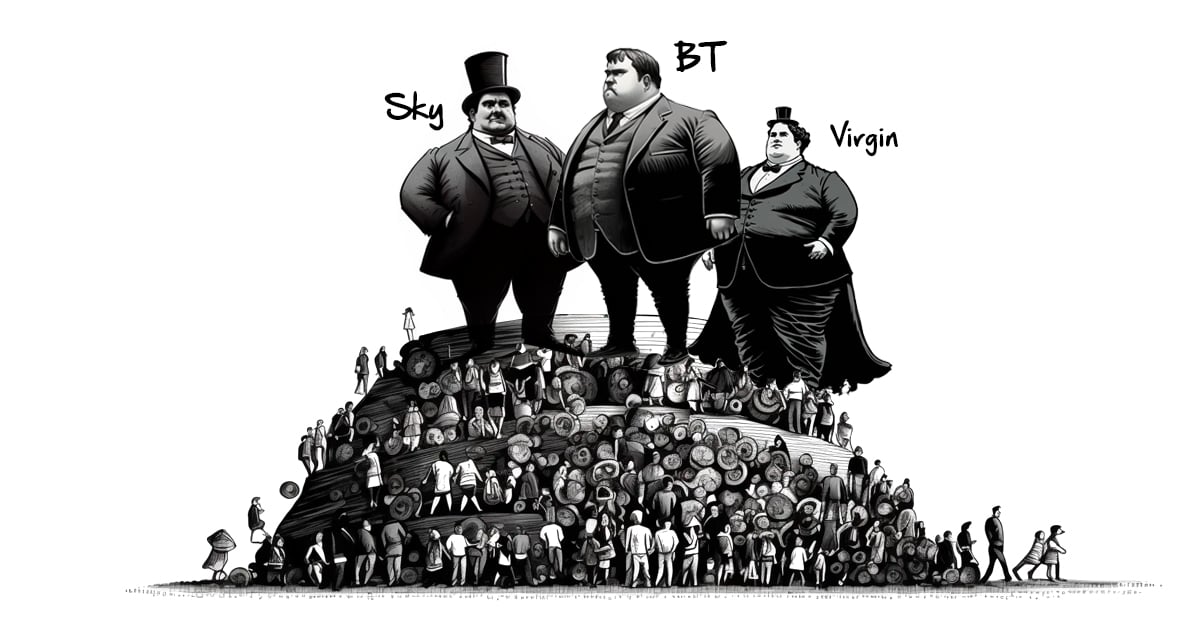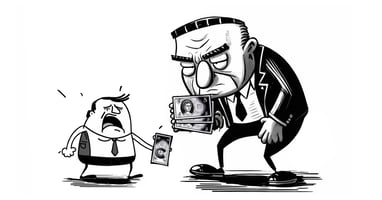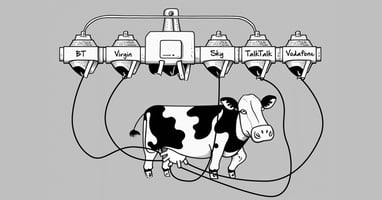Customers distrust broadband providers for good reason. The list of legitimate griefs is long. But...
Why it's time for a rebellion
The entire system is broken and customers are suffering
You only have to look at the Trustscores for major broadband companies to see that something is very wrong with the UK broadband market. Over 25 million people are very unhappy with their provider. How on earth did we get here?
Let’s take a look at the Big Broadband playbook:
- Overpromise, underdeliver. Almost every Trustpilot review starts the same: something isn’t working. It may be an inconsistent connection, it may be slow download speeds buffering content, it may be no Wi-Fi coverage in a particular room. You bought into ultrafast broadband and whole-home Wi-Fi guarantees and you’re not getting either. It’s frustrating, to say the least. So you call customer services.
- Under-serve an unhappy customer. It’s a nightmare getting hold of customer services. When you finally bypass the no-reply email addresses and infuriating chatbots, you eventually speak to a human. And they still don’t help. That’s a fast way to turn frustration into anger.
- Throw in an unexpected price increase. Most broadband companies raise their prices annually. The first you hear of it is usually when it hits. Not only is it unexpected, it’s bigger than it should be - but we’ll get to that later. Angry? You should be outraged. You’re being taken for a ride.
- Don’t let anybody leave. Surely a customer this unhappy would just switch providers? Well, they want to, but they’re stuck in a 24-month contract (with the smallest of small print). So you’re trapped. If you were feeling outraged before, now you’re just feeling hopeless.
My guess is that you’ve experienced something similar. We all have. None of it comes as a surprise, but what you might not know is why this is the case - and why it’s never going to change.
That’s where I come in. I know these things, because I’ve been inside the belly of the beast.
Legacy broadband providers cannot be fixed
My name is Tucker George and I led Business Transformation at BT. My job was clear: transform a legacy and dying corporation into a customer-centric and profitable business. It sounded exciting. It sounded like I had the potential to make a real difference for millions of unhappy customers. It sounded like something I could be proud of.
I remember when I told former colleagues and friends I was joining BT. They were stunned. They tried to convince me it was a mistake and career suicide. Sometimes, you should listen to the smart people around you. But I was (am) bull-headed. I was convinced that I would succeed where others had failed. I was wrong, but it took me two years to figure out why.
The simple but unpleasant truth is that it is structural and pre-determined for BT to treat customers poorly. BT was not formed by entrepreneurs who focused on meeting customer needs. BT was, until Thatcher, the state-owned monopoly telephone company that operated as a division within the Post Office. It was built within the definition of bureaucracy. It can’t help itself. By design, it is slow, risk averse, and resistant to change.
When businesses are created to serve customers and solve their problems, customers benefit. However, when corporations are created to serve other purposes, either due to regulation or by the government, customers usually suffer.
In BT’s case, the entire focus is on short-term profits. Partly because they lack the innovation to offer compelling products, and partly because leadership knows that their business peaked decades ago. So their job is to gracefully manage inevitable decline without unnerving investors. Not what you want to hear if you’re a customer.
So why not leave BT and use another provider? Well, because the same thing is happening everywhere else. Just look at the Trustpilot reviews. Suffering at the hands of legacy broadband providers is universal. Why move when they’re all the same?
In all fairness, calling them Legacy Broadband is a bit of a misnomer. Legacy, yes. But they aren’t broadband businesses at all, and this is part of the problem. None of these corporations began as broadband providers. Broadband has never been their core competency.
BT was a state-owned copper telephone division within the Post Office. TalkTalk was founded as a part of Carphone Warehouse to sell fixed line telephony services. Virgin is the combination of various cable television businesses. Sky is a broadcaster that sells television and sports channels. Vodafone and EE are mobile companies who sell iPhones.
It’s not a golden rule that broadband companies are evil; this issue is quite specific to the UK, because none of these companies specialise in home internet.
You can’t just “change” the fundamental wiring of a business. I came to realise that my job was actually magician: turn a dying elephant into a cheetah. Not going to happen.
I realised that if I really wanted a cheetah, then I’d need to leave BT and start from scratch.
So that’s what I did.
When the entire system is broken, it’s time for a rebellion.
Identifying the issues with Big Broadband is easy. Changing them is much harder, because these problems are ingrained in the fabric of their businesses. This is what I mean when I say ‘legacy’. They’re stuck in the past.
They can pump out marketing full of grandiose promises, change a logo, update a slogan. But those are gimmicks, short-term, and don’t help customers.
That’s why it’s time for a rebellion. For real change, we had to throw out the playbook and reinvent everything.
The result is Rebel.



-png-1.png?width=896&height=319&name=Rebel%20Table%20(1)-png-1.png)


